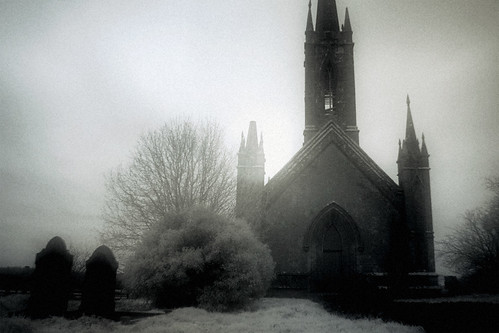 I wanted to give you a bit of historical background on George Fox. I think it might help us put the story from his journal in context. I will fill in more of the details on Monday night. Enjoy the readings.
I wanted to give you a bit of historical background on George Fox. I think it might help us put the story from his journal in context. I will fill in more of the details on Monday night. Enjoy the readings.George Fox was born in England in 1624. He lived during a time when Europe in general and England in particular were experiencing much religious conflict. Fox was in many ways a dissenter of the state church in England, and thus he was heavily persecuted. The following is a basic summary of his work from Justo Gonzalez' The Story of Christianity.
At that time there were in England many religious sects, Fox attended all without finding contentment in any. Finally, he felt called by the Spirit to speak out at a Baptist meeting, announcing the inner truths in which he now believed. From that point, such urgings of the Spirit became more frequent. In gatherings of various sects, Fox would declare that he had been ordered by the Spirit to announce his spiritual vision of Christianity. His words were often received with contempt and hostility, and he was repeatedly thrown out of meetings, beaten, and stoned. But such incidents would not stop him...the number of his followers grew rapidly.
There were many who disliked the teachings and practices of Fox and the Quakers. Religious leaders resented the manner in which these "fanatics" interrupted their services in order to preach or to read Scripture...all this seemed disrespectful and an intolerable insubordination. As a result, Fox was repeatedly beaten, and he spent a total of six years in prison. He was sent to prison for the first time for having interrupted a preacher...On other occasions he was accused of blasphemy, or of conspiring against the government...On another occasion, when he was serving six months for blasphemy, he was offered his freedom in exchange for service in the republican army. He refused...and from that point on, the Friends have been known for their staunch pacifist convictions.
Justo L. Gonzalez, The Story of Christianity, Vol. 2 (New York: HarperSanFrancisco, 1985), 198-201.
 The Reformation Era: Part II
The Reformation Era: Part II
 The Reformation Era
The Reformation Era
 Both Thomas a' Kempis and Francis of Assisi emphasized the importance of
Both Thomas a' Kempis and Francis of Assisi emphasized the importance of